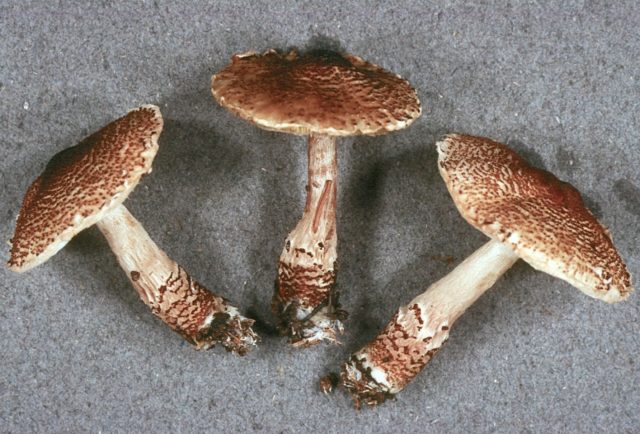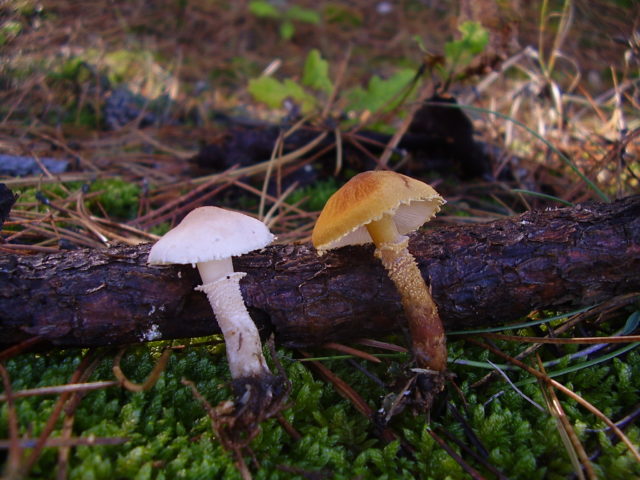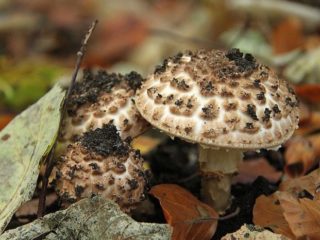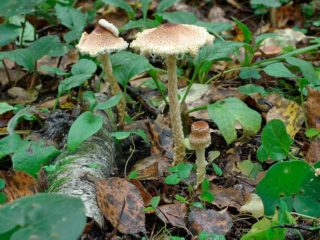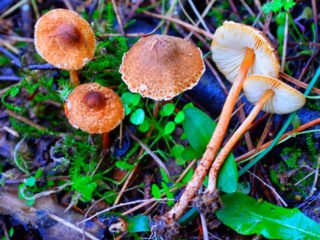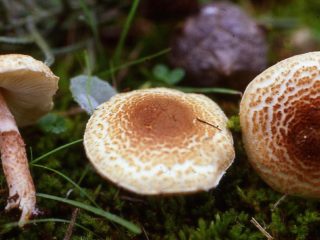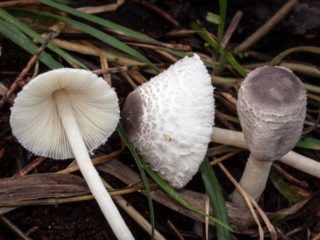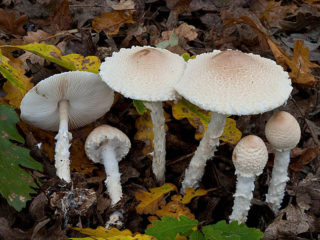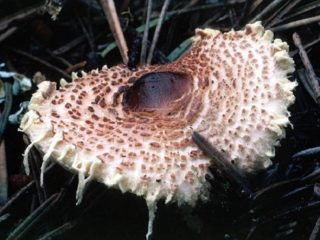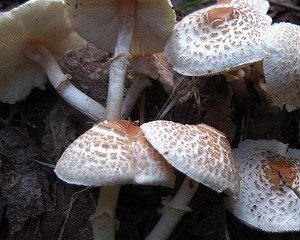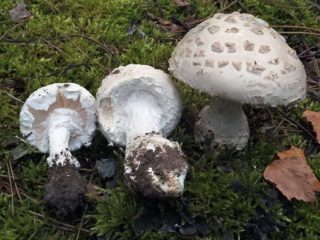Content
Scaly lepiota is a type of poisonous mushroom that belongs to the Champignon family. People may call it an umbrella mushroom.
What scaly lepiots look like
This mushroom has a small convex or flat-spread cap. In scaly lepiota, it is distinguished by a slightly lowered, sometimes bent inward frame, in which the color is similar to weathered meat.
From above, this surface is entirely covered with scales, like concentric circles converging towards the center.
Free wide plates are located under the cap of the lepiota. Their color is creamy, slightly greenish. Spores of the fungus are ovoid, completely colorless. The leg of a poisonous plant is low, cylindrical in shape, with fibrous remains located in the center from the ring. The pulp is dense, at the top of the legs and caps of a cream shade, at the bottom - cherry.
Young lepiota smells like fruit, old mushroom smells like bitter almonds. The ripening period takes place from mid-June and lasts until the end of September.
Where scaly lepiots grow
Scaly lepiota grows in North America and Europe, Ukraine, southern Russia and the countries of Central Asia. It is a saprophyte that lives both on the soil and inside plant debris. Because of this, the mushroom is quite common across continents.
You can meet this variety in such places:
- forest or meadow;
- park lawn;
- trees;
- straw;
- processed wood;
- dry palm branches.
Is it possible to eat scaly lepiots
Scaly lepiota can be easily confused with deceptive cystoderm, which is allowed to be eaten. The umbrella mushroom is distinguished from the edible by the presence of scales merging in the center (forming a closed cover). They are absent from the edible counterpart. Also, his leg does not contain a film ring.
For this reason, you should be very careful when picking mushrooms. If you are not sure, it is better to refuse any tasting. Scaly lepiota is a highly poisonous mushroom, which contains cyanides and nitriles. These are very dangerous substances against which there are no antidotes.
Cyanides cause damage to the central nervous system, as well as the brain, nitriles lead to paralysis of the respiratory system. The concentration of poison in scaly lepiota is low. But it is enough for poisoning, so the appearance of the fungus is dangerous even if its spores are inhaled.
Poisoning symptoms
After the scaly lepiota mushroom has been eaten, signs of poisoning are noted quite quickly (after 10 minutes). Once in the digestive system, toxins enter the bloodstream. The victim has profuse vomiting, and a transparent or white foam may also appear on the lips. It is caused by massive rupture of the alveoli of the lung tissue.
The temperature rises. Sometimes bluish patches form on the skin. The person has difficulty breathing.Limbs may not work due to damage to the central nervous system. After half an hour, cardiac arrest is likely.
First aid for poisoning
In case of poisoning with scaly lepiota, self-medication cannot be carried out. If minor manifestations of malaise occur after eating an umbrella mushroom, you should urgently call an ambulance or take the patient to the hospital yourself.
Since the main provocateur of scaly lepiota poisoning is its toxins that have penetrated into the blood, the first measure of emergency assistance will be to remove those substances that have not had time to be absorbed by the circulatory system.
This activity is recommended to be performed in several ways:
- immediately rinse the stomach after poisoning with lepyote, scaly boiled water (at least 1 liter) or a light solution of potassium permanganate, then press with two fingers on the base of the tongue, provoking vomiting;
- drink any sorbent in the calculation of at least 0.5 g for each kilogram of its own weight;
- when there is no diarrhea, it is better to drink a laxative in a dose of 1 g for each kilogram of weight in two doses;
- to prevent the risk of blood flow disturbances, apply warmth to the peritoneum and legs;
- drink strong tea constantly.
Treatment of poisoning with scaly lepiota is carried out by toxicological departments. Wellness activities include the following:
- gastric lavage using a thick tube;
- taking a saline laxative;
- implementation of forced diuresis.
In case of poisoning with scaly lepiota, drugs are also used, the dosage of which and the frequency of administration are prescribed by the doctor. If necessary, use hemosorption using a carbon column. Also, in the course of treatment, measures are taken that stop further damage to internal organs.
Severe poisoning with squamous lepitis provokes chronic renal and hepatic failure, which requires transplantation of these organs. Such poisoning by pregnant women is dangerous, since toxins can penetrate the placental barrier, damaging the fetus, provoking a miscarriage or premature birth.
Conclusion
If experienced mushroom pickers are present in the environment, then it is better to show them the plucked mushroom and make sure that it is not a scaly lepiota. Mushrooms are a healthy and tasty product that can be easily prepared in many dishes and even used for medical purposes. But before going into the forest, you need to carefully study the information about the differences between poisonous specimens and edible counterparts.
